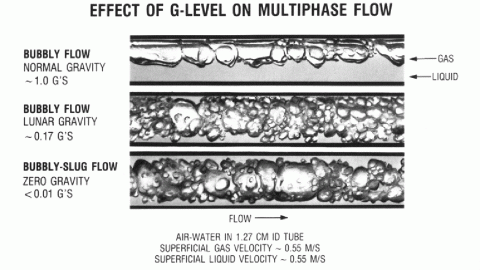NASA’s Physical Sciences Research Program selected six ground-based proposals in response to the Physical Sciences Information System Call for Proposals. This program element is part of the Earth and Space Sciences Research Opportunities – 2022 (ROSES-2022) solicitation of the Science Mission Directorate (SMD). These six research projects, involving recognized experts in the fields of biophysics, combustion science, complex fluids, fluid physics and materials science, will use data contained in the PSI system and build on previous research on reduced gravity to advance fundamental research in the physical sciences.
The researchers will examine important problems with existing data from NASA’s Physical Sciences Informatics (PSI) system. The online database contains data from completed physical science reduced-gravity flight experiments conducted on the International Space Station, Space Shuttle flights, free-flying spacecraft, commercial cargo flights to and from the space station, or from related ground-based studies.
One of the selected studies will seek to fill the knowledge gap on how fires behave and how materials burn in partial gravity environments. The proposed work would exploit data on the flammability of materials in microgravity and normal gravity conditions to predict the combustion behaviors and flammability limits of solid materials in partial gravity. As NASA and commercial space companies expand their exploration into deeper space, spacecraft fire safety has become more important. This project is led by Prof. Ya-Ting Liao (Case Western Reserve University).
Another selected investigation proposes a numerical simulation to model multiphase flow using data from the Capillary Channel Flow Phase Separation Experimental Unit. Multiphase flow and heat transfer in restricted geometries are important but difficult to simulate. This study proposes a multiscale computational model that will allow efficient and accurate simulations of such flows in microgravity conditions. Multiphase flows are critical to the design and operation of fluid and thermal systems in spacecraft; and this effort will help establish a multiscale simulation infrastructure, which will enable the simulation of thermal management systems in microgravity environments. The results of the proposed simulation will help inspire new experiments in the future. The project is led by Prof. Yue Ling (University of South Carolina).
Selected submissions come from six institutions in six states, with a combined total award amount of approximately $1.12 million during a two-year period.
The Physical Sciences Research Program is managed by the Division of Biological and Physical Sciences in NASA’s Science Mission Directorate. This program conducts research in fundamental and applied physical sciences, with the goal of paving the way for scientific discovery, enabling space exploration, and providing benefits on Earth. Both types of research have resulted in improved space systems or new products on Earth. The program promotes fundamental research investigating the laws of the universe and of physical phenomena in weightlessness. The program also conducts applied research, which contributes to the basic understanding of the underlying space exploration technologies that will aid our return to the Moon and our journey to Mars and beyond.
Below is the full list of shortlisted proposals, principal investigators and their organizations:
- Jeffrey AllenMichigan University of Technology, Low-order modeling of interfacial dynamics to enable large-scale mission duration simulations of low-gravity propellant handling using CVB PSI data
- Eric FurstUniversity of Delaware, Growth of self-assembled microstructure in directional fields
- Ya-Ting LiaoCase Western Reserve University, Prediction of flammability of materials in partial gravity using microgravity and terrain data
- Yu LinUniversity of South Carolina, Multiscale simulations of two-phase flows and heat transfer in confined geometries using built-in thin-film models
- Douglas MatsonTuft College, PSI Revisits EML Video Images from EML Job (PREVIEW)
- Peter VechilovUniversity of Houston, Solution convection and nucleation precursors in protein condensation
#NASA #selects #proposals #provide #insights #openly #data #physical #computer #system
Image Source : science.nasa.gov

